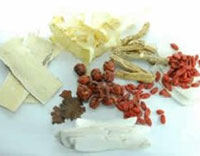Premenstrual syndrome (PMS) is the most common disorder for women during their reproductive years, but it doesn’t have to be. Asian cultures have been using Traditional Chinese Medicine (TCM) to treat the hormonal imbalances that accompany menstrual cycle related symptoms for centuries. Chinese medicine calls this an imbalance of Qi in the reproductive and other related organs. Acupuncture and herbs can re-establish the flow of Qi and bring a balance to the body allowing the body to function optimally without hormone regulators such as a birth control pills.
 Often the underlying problem with PMS is the hormonal imbalance. Estrogen levels are commonly too high in relation to progesterone levels. What’s causing this imbalance? The most common cause is our diets. Hormones are sensitive and overeating and obesity often lead to conversion of androgens to estrogen by aromatase. High fat diets, refined sugars and carbohydrates, processed foods and artificial sweeteners, dairy products and even commercially raised livestock are all a source of estrogen exposure. Limiting our exposure of so called “artificial or xeno-estrogens” is not difficult. Eat a balanced healthy diet and choose hormone free meat. Not surprising, exercise helps keep the balance, whereas alcohol and constipation both disrupt the balance.
Often the underlying problem with PMS is the hormonal imbalance. Estrogen levels are commonly too high in relation to progesterone levels. What’s causing this imbalance? The most common cause is our diets. Hormones are sensitive and overeating and obesity often lead to conversion of androgens to estrogen by aromatase. High fat diets, refined sugars and carbohydrates, processed foods and artificial sweeteners, dairy products and even commercially raised livestock are all a source of estrogen exposure. Limiting our exposure of so called “artificial or xeno-estrogens” is not difficult. Eat a balanced healthy diet and choose hormone free meat. Not surprising, exercise helps keep the balance, whereas alcohol and constipation both disrupt the balance.
Regulating hormone levels is a key component to combating PMS and Chinese herbs can help maintain a hormone balance through several methods. (See PMS Relief Herbs Pack) Many Chinese herbs have hormone enhancing properties. One such herb is Dang Gui. Several new studies have examined dang gui with a combination of herbs (also called herbal formulas). We know herb formulas, or a combination of herbs, are very effective and since dang gui is known as the “women’s ginseng”, it’s an indispensable herb for PMS symptoms. Although contradicting literature has been published on the phytoestrogen content in dang gui, it does have a plethora of well established and proven actions. In TCM it is a blood tonic and has warming and dispersing actions. Numerous studies prove dang gui and other Chinese herbs nourish our blood. Monthly blood loss take a toll on women over time, and a healthy diet, including herbs are the fuel necessary to replenishing the blood that is lost each month.
Many Chinese herbs contain high amounts of essential fatty acids which also help maintain our natural hormonal balance. Some do this by improving liver functions. The liver is viewed as part of the reproductive system in Chinese medicine. It’s imperative to help the liver regulate the production of prostaglandin hormones and strengthen the liver’s ability to synthesize proteins and fat. This facilitates the body’s ability to regulate itself. Bupleurum and Rehmannia are two traditional Chinese herbs which have clinically tested and proven liver tonifying properties. Strengthening liver functions is another way Chinese herbs helps an over-active uterus and therefore reduce PMS symptoms. Advil, Tylenol and other NSAIDS only cover up your pain and can cause more harm to your liver function. Chinese herbs work at the root of the disharmony.
A recent study of 549 women in Australia documented results on the severity of PMS and the effectiveness of Chinese herbs to reduce the severity.[1] By restoring the imbalance in the reproductive system, herbal medicine can prevent monthly menstrual cramps, depression, PMS, and abdominal pain.
Maintaining a healthy hormone balance (part of homeostasis) is essential throughout life and will undoubtedly also help PMS symptoms. Be in control of your body and how it functions. Give yourself healthy foods and plant based medicine like Chinese herbs and you’ll naturally balance your body’s energy and restore your body’s natural hormone balance.
For more information on this subject call us and talk to our Licensed Acupuncturist/herbalist. Go to Contact Page.
Notes: “When the balance of Omega 3 and 6 fatty acids are off, it causes an inability of conversion from linoleic acid to GLA resulting in increasing the risk of over production of PGE2 and premenstrual pain and cramps.”[2]
REFERENCES
- Chinese herbal medicine for premenstrual syndrome , Jing Z, Yang X, Ismail KMK, Chen X, Wu T
- Dijsselbloem N, Vanden Berghe W, De Naeyer A, Haegeman G. Soy isoflavonephyto-pharmaceuticals in interleukin-6 affections. Multi-purpose nutraceuticals atthe crossroad of hormone replacement, anti-cancer and anti-inflammatory therapy. Biochem Pharmacol. 2004;68(6):1171-1185. estrogen disruptors induce precocious puberty? Minerva Pediatr. 2006;58(3)
- Lee JM, Appugliese D, Kaciroti N, Corwyn RF, Bradley RH, Lumeng JC. Weight statusin young girls and the onset of puberty. Pediatrics. 2007;119(3):e624-e630.
- Steingraber S. Living Downstream: An Ecologist Looks at Cancer and the Environment. Boston, Mass: Addison Wesley Publishing Co; 1997.
- Wiksten-Almstromer M, Hirschberg AL, Hagenfeldt K. Menstrual disorders and associated factors among adolescent girls visiting a youth clinic. Acta Obstet GynecolScand. 2007;86(1):65-72.
- Halbreich U, Borenstein J, Pearlstein T, Kahn LS. The prevalence, impairment,impact, and burden of premenstrual dysphoric disorder (PMS/PMDD).Psychoneuroendocrinology. 2003;28 Suppl 3:1-23.
- Medical Herbology & Pharmacology by John K. Chen, Tina T. Chen Art of Medicine Press, 2004
This post is proud to be part of thekathleenshow.com Prevention not Prescription Tuesday’s blog roll.

 If you’ve been suffering from PMS and menstrual cramps, adding a 1 gram capsule of mixed essential fatty acids to your daily diet could help reduce your symptoms say’s a group of researcher in Brazil. This is not the first research to link PMS and essential fatty acid (EFA) intake. Since our bodies can only produce fatty acids, (long chain molecules) from the foods we eat, then our bodies will be deficient if
If you’ve been suffering from PMS and menstrual cramps, adding a 1 gram capsule of mixed essential fatty acids to your daily diet could help reduce your symptoms say’s a group of researcher in Brazil. This is not the first research to link PMS and essential fatty acid (EFA) intake. Since our bodies can only produce fatty acids, (long chain molecules) from the foods we eat, then our bodies will be deficient if